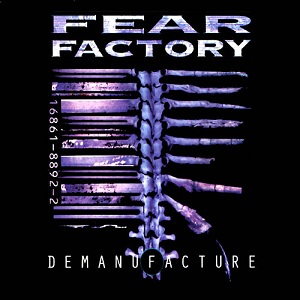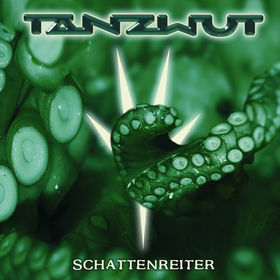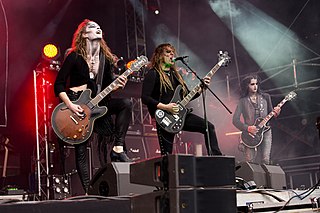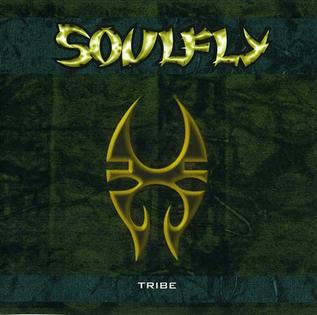Doom metal is an extreme subgenre of heavy metal music that typically uses slower tempos, low-tuned guitars and a much "thicker" or "heavier" sound than other heavy metal genres. Both the music and the lyrics intend to evoke a sense of despair, dread, and impending doom. The genre is strongly influenced by the early work of Black Sabbath, who formed a prototype for doom metal with songs such as "Black Sabbath", "Children of the Grave", "Electric Funeral" and "Into the Void". During the first half of the 1980s, a number of bands from England, the United States and Sweden defined doom metal as a distinct genre.

Megaherz is a German industrial metal group formed in Eichenau in 1993.
Symphonic metal is a subgenre of heavy metal music which combines the heavy drums and guitars of metal with different elements of orchestral classical music, such as symphonic instruments, choirs and sometimes a full orchestra. Keyboards reminiscent of power metal are also sometimes featured.

Demanufacture is the second studio album by American industrial metal band Fear Factory, released on June 13, 1995 by Roadrunner Records. Burton C. Bell wrote the majority of the lyrics and Dino Cazares wrote all the music. This is the band's first album with their classic line-up; adding new bassist Christian Olde Wolbers. Although credited, his actual input is disputed between current and former band members. Many regard it as the band's best album and a heavy metal classic. The album was certified Gold in Australia by ARIA and Silver in the UK by the BPI.

Coroner is a Swiss thrash metal band from Zürich. They garnered relatively little attention outside of Europe. Formed in 1983, the band broke up in 1996, but reformed 14 years later. The band has performed at multiple live venues and festivals around the world since 2011, and plans to release a new album in 2019. Coroner's music combines elements of thrash, classical music, avant-garde music, progressive rock, jazz, and industrial metal with suitably gruff vocals. With their increasingly complex style of progressive rock-infused thrash, they have been called "the Rush of thrash metal". Coroner's sound then progressed and the production became more refined, resulting in the more progressive albums No More Color (1989), Mental Vortex (1991) and Grin (1993).
Bethlehem is a German extreme metal band from Grevenbroich, formed in 1991 by Jürgen Bartsch and Klaus Matton. Before starting Bethlehem, Bartsch and Matton used to play in a German thrash metal band Morbid Vision. Many of their lyrics revolve around sickness, morbidity, suicide, death and madness, and may to some extent be personal to the band.
Darkseed was a German gothic metal band, formed in 1992. Darkseed, beginning as a death metal band, took a more unconventional song writing method that aimed more towards the gothic experimental route. They changed their music to gothic metal on their first studio album Midnight Solemnly Dance.

Schattenreiter is the fourth full-length studio album by the German industrial rock/medieval metal band, Tanzwut. Schattenreiter was released on April 7, 2006 by PICA Music as a two-CD digipack. The album marks their newfound sound, which incorporates a more down-tuned use of guitars, darker atmospheres and harsher vocals at times than their previous albums, making them lean towards industrial metal.

White Gothic is the debut album by the German gothic metal band Necromance released in 1997.

Hubert Kah is a German synthpop band, led by Hubert Kemmler. Kemmler is a German musician, composer, songwriter and producer.

Tribulation are a Swedish heavy metal band from Arvika that formed in 2005. In early 2009, the band released its debut studio album The Horror. Their second full-length studio album The Formulas of Death was released in 2013. In 2015, they released their third full-length studio album Children of the Night which showed a departure from the death metal sound of their first two albums, drawing significantly on traditional heavy metal, black metal, psychedelic rock, gothic rock, as well as the occult and supernatural mythology.
"September Sun" is a single by gothic metal band Type O Negative from the 2007 album Dead Again. The nearly ten minute song was edited to just 4½ minutes for the single release. The single was released on January 14, 2008, ten months after the album's release on March 13, 2007. "September Sun" was the band's final single released before the passing of frontman Peter Steele.
Vatra is the fifth studio album by the Yugoslav and Bosnian heavy metal band Divlje Jagode. The album was recorded at Studio RTV Sarajevo, Sarajevo, Bosnia and Herzegovina from November to December 1984, and mixed at Music Paark Studio in Bad Homburg vor der Höhe, Germany on February 1985 and was released in April 1985. It was the first time that Alen Islamović make an album just as vocal as he was before and vocalist and bassist also. The album contained nine songs with a real glam and hair metal sound, but also see the influence of Black Sabbath and Saxon, with the occasional Judas Priest riff. Islamovic wrote the lyrics for most songs, and the album had one song on English titled "Touch Me Little Girl" was written by their producer Theo Werdin.
"The Profit of Doom" is a single by gothic metal band Type O Negative from the 2007 album Dead Again. The single version of the song is 4½ minutes long, but lasts nearly eleven minutes on the album. The single was released just before the album was released in February 2007. A music video was released for the song.

"Tribe" is the fourth single by metal band Soulfly, released in January 1999. It is played as the ninth track of the eponymous debut album Soulfly, after "Bleed" and before "Bumba". "Tribe" is the fourth and last single of the album. As with every other Soulfly songs with vocals, the lyrics were written by Max Cavalera.

The Children of the Night is the third studio album by Swedish death metal band Tribulation. It was released on 20 April 2015 through Century Media Records.











